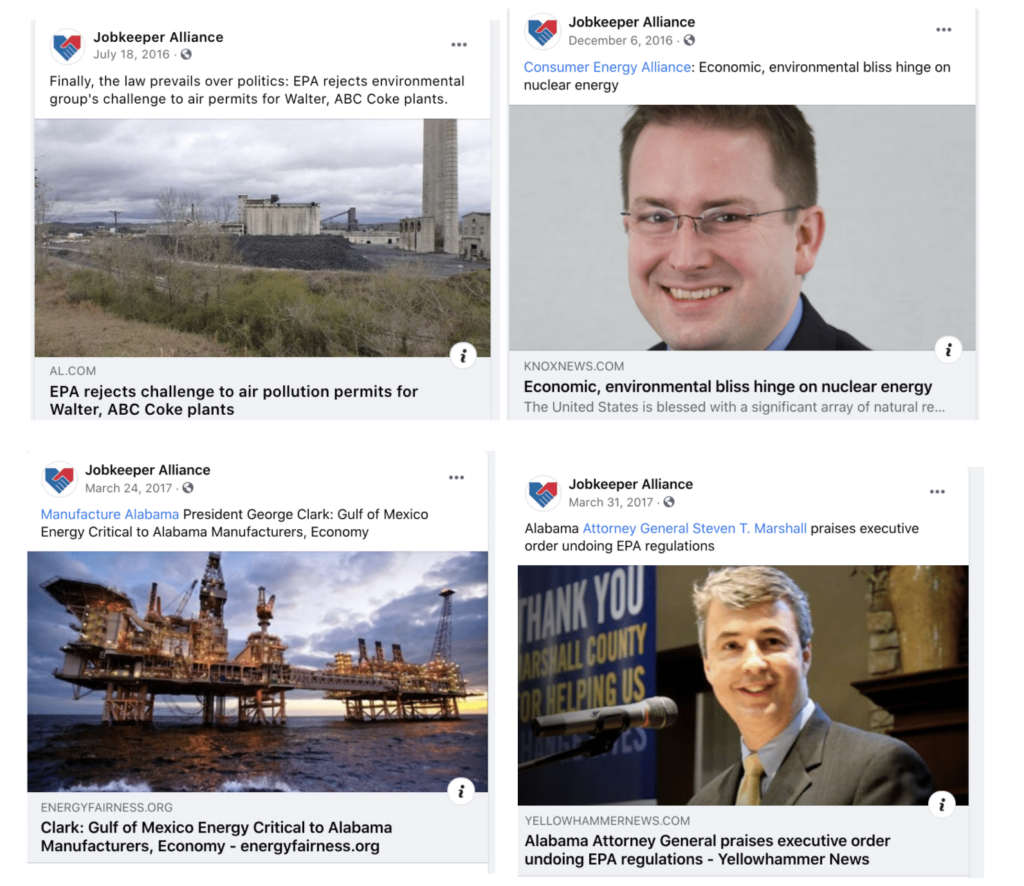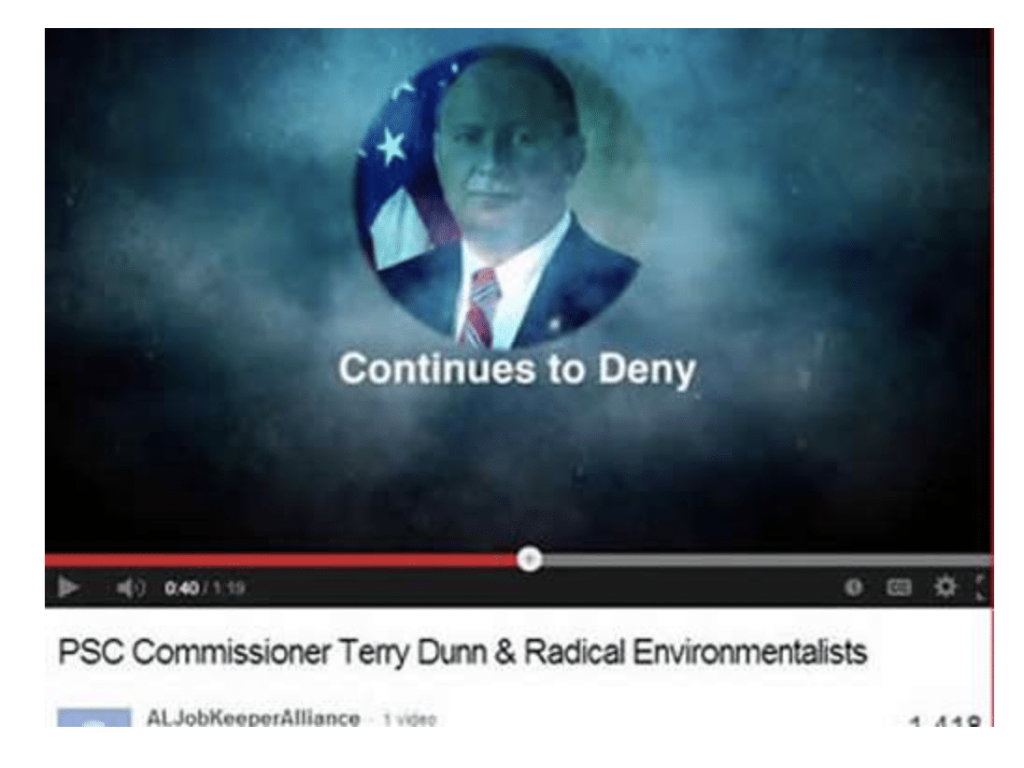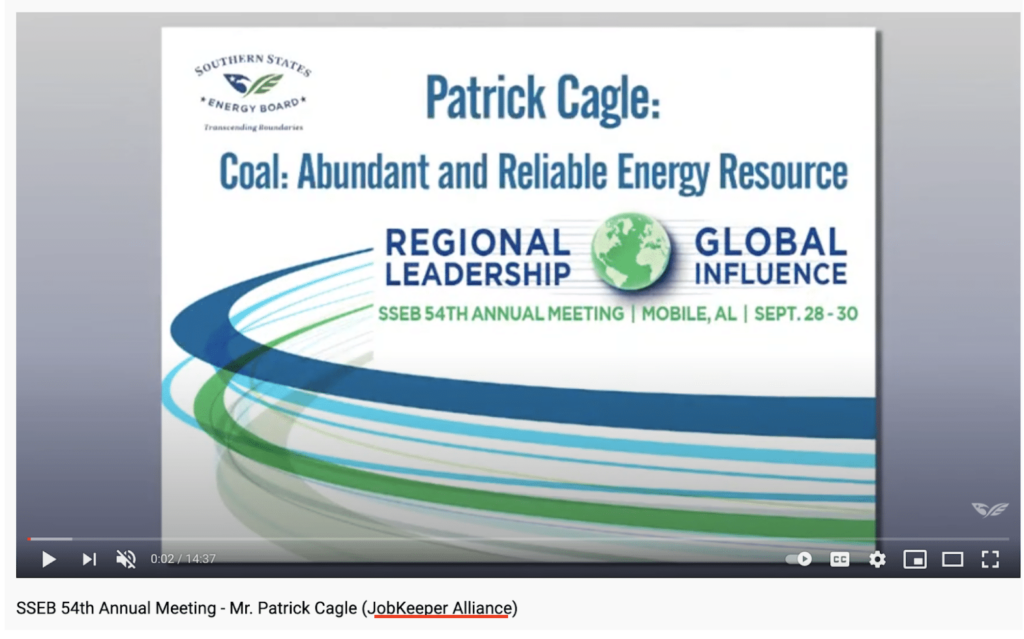Jobkeeper Alliance
Jobkeeper Alliance is an Alabama-based, utility-connected organization with a history of advocating for the coal and utility industries and of attacking environmental groups and efforts, including EPA regulations.
Jobkeeper Alliance has a history of attacking individuals or organizations that criticize utilities and fossil fuel companies and has recently focused its efforts on Alabama and Florida, where it filed a failed complaint against the Energy and Policy Institute (EPI)’s Alissa Jean Schafer. The Florida Ethics Commission unanimously dismissed the claim against Schafer for having no probable cause on March 5, 2021, in agreement with the no-cause recommendation from the Florida Attorney General’s office.

Jobkeeper Alliance is a 501(c)(4) organization. The IRS categorizes such organizations as “social welfare” groups; they are commonly referred to as “dark-money” organizations because they may work to influence elections without disclosing their donors. While Jobkeeper does not disclose its donors, other 501(c)(4) groups with ties to utilities have been required to disclose their funding of Jobkeeper on tax filings.
In the 2018 election cycle, Jobkeeper Alliance was the primary funding source for the Jobkeeper Political Committee in Florida and came under fire for its dark money and special interest connections. Jobkeeper Alliance also has close ties to the utility-funded group Associated Industries of Florida (AIF).
AIF is a trade association of Florida corporate interests, including utilities, with connections to a number of affiliated PACs and non-profits, including “A Better Miami-Dade Inc.” A Better Miami Dade Inc. and the Jobkeeper Alliance appear to have sent money back and forth, with A Better Miami-Dade having donated $100,000 to Jobkeeper in 2018, according to A Better Miami-Dade’s IRS filings. Jobkeeper reported its own donation of $180,000 to A Better Miami-Dade in the same year, according to its most recently available IRS filings. As of March 2021, the IRS does not list a 2019 filing from the Jobkeeper Alliance. In the 2020 election cycle, Florida utilities donated nearly $2 million to AIF and its associated PACs.
From its founding in 2012 through 2017, Jobkeeper received $727,152 from Alabama-based “People’s Alliance for Leadership”, and $857,025 from “Vote Alabama.” Both groups have refused to answer questions about their funding, but have had close historical ties to utilities in the Southeast: Mike Fields, the head of People’s Alliance for Leadership was a paid consultant for Alabama Power.
Both of Jobkeeper’s known funders, People’s Alliance for Leadership and Vote Alabama, have also funded other utility groups, like Energy Fairness, formerly known as the Partnership for Affordable Clean Energy, which has advocated on behalf of Florida’s utilities against ballot initiatives that threatened their monopolies.
JobKeeper is also associated with Matrix LLC, a public relations firm that has been funded by utilities with a reputation of using aggressive tactics to intimidate opponents of its clients. Internet records reveal Matrix worked to revive JobKeeper after years of silence – Jobkeeper went almost three years without posting to its website. Matrix LLC, and its leader Joe Perkins, have received hundreds of thousands of dollars from Southern Company subsidiary Alabama Power.
Jobkeeper and EnergyFairness’ websites appear almost identical in nature.
In Alabama, Jobkeeper played a leading role in a smear campaign of former Public Service Commissioner Terry Dunn in 2014. Dunn was a vocal critic of Alabama Power who advocated for formal reviews of the utility’s rates which would have likely led to decreasing the utility’s profit margin. An EPI analysis later found that Alabama Power earned more than $1 billion in excess profits from 2014-2018 compared to the industry average. Jobkeeper, at the time known as Alabama Jobkeeper Alliance, shared content attacking Dunn:

Over the years, Jobkeeper has shared similar messaging and policy goals as other anti-environment groups, including the utility front group “Consumer Energy Alliance” (CEA). CEA is an advocacy front group for some of the country’s largest fossil fuel corporations and trade associations. Its members include many utility companies and utility-supported organizations such as state chambers of commerce, although the current website has removed previously listed investor-owned utilities. Florida utility TECO remains listed, along with a long list of fossil fuel companies. CEA has a track record of being at the forefront of attacks against rooftop solar around the country, including its role in the utility-funded anti-rooftop solar “Amendment 1” group called “Consumers for Smart Solar” in 2016. Florida Power & Light, which was a CEA member, was the leading funder of Amendment 1.

Failed Ethics Complaint, Smear Campaign Tactics, Advocacy Attacks
The timeline of events surrounding Jobkeeper Alliance’s complaint against Schafer indicates that it was attempting to intimidate critics of utilities’ misdeeds.
Jobkeeper Alliance published a press release on its website dated September 14, 2020 stating that it had filed an ethics complaint against Schafer “last week,” despite the complaint not being officially filed until October 2. The Capitolist, a political blog that often criticizes Democrats and left-leaning politicians, published a blog post attacking Schafer and discussed the ethics complaint on September 17, 2020, and a second blog post on October 2. The second post was in response to an article in Jacksonville’s paper, the Florida Times Union, that was critical of Florida Power and Light, and which cited Schafer’s work with EPI.
The Capitolist ran paid Facebook ads promoting these blog posts; one on September 17, 2020, and another October 5-9, 2020. The date on the ethics complaint shows that the Florida Ethics Commission did not receive it until October 2, 2020. The notarized date on Jobkeeper’s ethics complaint is September 23, 2020, well after Jobkeeper’s press release and the media push.
On September 11, days prior to Jobkeeper’s press release, Schafer published an article on the EPI website that was critical of Florida utilities, focusing on donations that the utilities had made to a Florida lawmaker, Lawrence McClure, who had initiated an attack on Florida’s rooftop solar policy. A workshop at the Public Service Commission, prompted by McClure, took place on September 17, the same day that the Capitolist published and ran ads attacking Schafer for the yet-to-be-filed ethics complaint.
The Ethics Commission unanimously dismissed the complaint against Schafer for no probable cause at a hearing on March 5. Leading up to the hearing, however, Jobkeeper Alliance ramped up its smear campaign against Schafer, sending out text messages and emails to Florida lawmakers, and placing additional pieces online in an effort to discredit Schafer, without waiting to hear the outcome of the hearing.
In the end, all of Jobkeeper’s loud, expensive attacks on Schafer and her ethics were in service of a complaint that had no merit.
Jobkeeper Alliance has targeted other groups that have been critical of utilities. In 2013, JobKeeper claimed that environmentalists were conspiring to manipulate utilities in Alabama because an anti-poverty group issued a report, authored by a clean energy technical expert, questioning Alabama Power’s rates and the lack of oversight in the state.
In 2020, JobKeeper defended Alabama Power when Gasp, a clean air advocacy group, and Energy Alabama, a clean energy advocacy group, called for the utility to issue a moratorium on service disconnections in the wake of COVID-19. JobKeeper accused the groups of waging a “vicious social media campaign against Alabama Power Company” and raising money off COVID-19. Despite JobKeeper’s rhetoric, Alabama Power later agreed to halt disconnections.
Jobkeeper Alliance’s Ad Spending
Utilities continue to stall and limit climate action by funding front groups to spread climate misinformation and false solutions to solve the crisis through advertising on social media networks.
Using data from the Meta Ad Library API and existing code from Brown University, EPI created a tool to expose the amount Jobkeeper Alliance is spending on advertisements about social issues, elections, or politics across Meta technologies, along with the specific regions the advertisements target.
